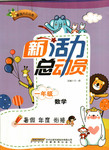题目内容
Children can ________ a lot _________ this new kind of school system.
A. benefit; from B. benefit; with C. change; from D. lose; from

 新活力总动员暑系列答案
新活力总动员暑系列答案 龙人图书快乐假期暑假作业郑州大学出版社系列答案
龙人图书快乐假期暑假作业郑州大学出版社系列答案Historians say Harriet Tubman was born in the year 1820.Nobody really knows. But we do know that Harriet Tubman was one of the bravest women ever born in the United States.
From a very early age,Harriet knew how slaves suffered. At six years old,she was sent to the fields. Working outside not only made her body strong but also made her learn about the Underground Railroad,on which she helped hundreds of people escape from slavery later. She also learned many things from the other slaves,which one day would help her lead her people to freedom. She became more of a rebel (反叛者).
In 1844,at about age 24,she married a free black man named John Tubman. By now,Harriet was sure she wanted to try to escape. Suddenly,the time came. Her owner died. Though opposed by her husband,she decided to escape. With the help of the Underground Railroad,and through a variety of suffering she finally crossed the border into Pennsylvania,where slavery was banned.
Now that Harriet was free,she did not forget the hundreds of other slaves back in Maryland. Harriet traveled back and forth eighteen times,helping about 300 slaves escape into free territory. She became an expert at hiding from slave hunters. The people she helped called her Moses. At one time,anyone finding Harriet was promised $40,000 for catching her-dead or alive.
During the Civil War,Harriet Tubman went into enemy territory to spy for the North. She also served as a nurse. After four years of bloody fighting,the North won the war.
After the fighting ended,Harriet Tubman returned to Auburn,New York. She kept working. She traveled and gave speeches to raise money for better education for black children. She also worked for women’s rights and housing. Harriet Tubman died in 1913.She was about 93 years old. By that time,she was recognized as an American hero. The United States government gave a funeral with military honors for the woman known as Moses.
1.Which of the following would be the best title for the text?
|
A.A History of American Black Slaves |
|
B.Cruel American Civil War |
|
C.Information on the Underground Railroad |
|
D.A Brief Introduction to Harriet Tubman |
2.Which of the following is true of the Underground Railroad?
|
A.It was a system that helped slaves escape from the South to North. |
|
B.It was a special train,on which slaves couldn’t be found easily. |
|
C.It was a special place where slaves could hide themselves. |
|
D.It was a group of people who would like to help the blacks. |
3.The sentence “Later,she told a friend,‘I felt like I was in heaven.’” can be placed at the back of Paragragh ________.
|
A.2 |
B.3 |
|
C.4 |
D.5 |
4.According to the text,we know that ________.
|
A.slavery was banned in all the states in America before the Civil War |
|
B.Harriet Tubman raised money for better education for white children |
|
C.the government gave her a funeral because she was Moses |
|
D.Harriet Tubman still worked for black people after the Civil War |